-
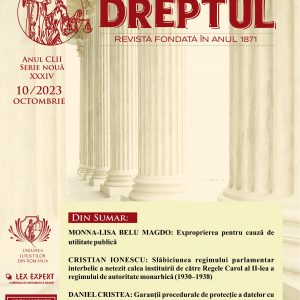
-
 In this study, by analyzing the legal issues of the respect due to persons also after their death, the author, after proceeding to a comparative law examination in the matter, further makes a study of the Romanian legislation in the field under debate (mainly, Articles 78–81 of the new Romanian Civil Code, as well as other legal provisions written down in special laws, such as: the Law No 95/2006 on the reform in the field of healthcare, the Law No 104/2003 on handling of human dead bodies and removal of organs and tissues from the dead bodies in view of transplant and others).
In this study, by analyzing the legal issues of the respect due to persons also after their death, the author, after proceeding to a comparative law examination in the matter, further makes a study of the Romanian legislation in the field under debate (mainly, Articles 78–81 of the new Romanian Civil Code, as well as other legal provisions written down in special laws, such as: the Law No 95/2006 on the reform in the field of healthcare, the Law No 104/2003 on handling of human dead bodies and removal of organs and tissues from the dead bodies in view of transplant and others). -
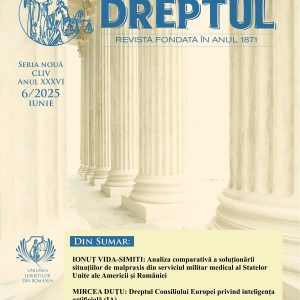
-
 Potrivit art. 10 C.pr.pen. alin. (1), părțile și subiecții procesuali principali au dreptul de a se apăra ei înșiși sau de a fi asistați de avocat; în alin. (2) al aceluiași articol se prevede că părțile, subiecții procesuali principali și avocatul au dreptul să beneficieze de timpul și înlesnirile necesare pregătirii apărării; apoi, în alin. (3) se arată că suspectul are dreptul de a fi informat de îndată și înainte de a fi ascultat despre fapta pentru care se efectuează urmărirea penală și încadrarea juridică a acesteia. Inculpatul are dreptul de a fi informat de îndată despre fapta pentru care s-a pus în mișcare acțiunea penală împotriva lui și încadrarea juridică a acesteia, [...]; în sfârșit, în alin. (5) se prevede că organele judiciare au obligația de a asigura exercitarea deplină și efectivă a dreptului la apărare de către părți și subiecții procesuali principali în tot cursul procesului penal.
Potrivit art. 10 C.pr.pen. alin. (1), părțile și subiecții procesuali principali au dreptul de a se apăra ei înșiși sau de a fi asistați de avocat; în alin. (2) al aceluiași articol se prevede că părțile, subiecții procesuali principali și avocatul au dreptul să beneficieze de timpul și înlesnirile necesare pregătirii apărării; apoi, în alin. (3) se arată că suspectul are dreptul de a fi informat de îndată și înainte de a fi ascultat despre fapta pentru care se efectuează urmărirea penală și încadrarea juridică a acesteia. Inculpatul are dreptul de a fi informat de îndată despre fapta pentru care s-a pus în mișcare acțiunea penală împotriva lui și încadrarea juridică a acesteia, [...]; în sfârșit, în alin. (5) se prevede că organele judiciare au obligația de a asigura exercitarea deplină și efectivă a dreptului la apărare de către părți și subiecții procesuali principali în tot cursul procesului penal. -
 The regulation (Article 227) of the new Criminal Procedure Code has a partial correspondent in the provisions of Article 146 paragraphs 8 and 111 and Article 1491 paragraphs 9 and 12 of the previous Criminal Procedure Code (1968). The authors analyze the institution of rejection of the proposal of preventive arrest of the defendant during the criminal prosecution, presenting some critical issues and proposing some improvements to the new regulation.
The regulation (Article 227) of the new Criminal Procedure Code has a partial correspondent in the provisions of Article 146 paragraphs 8 and 111 and Article 1491 paragraphs 9 and 12 of the previous Criminal Procedure Code (1968). The authors analyze the institution of rejection of the proposal of preventive arrest of the defendant during the criminal prosecution, presenting some critical issues and proposing some improvements to the new regulation. -
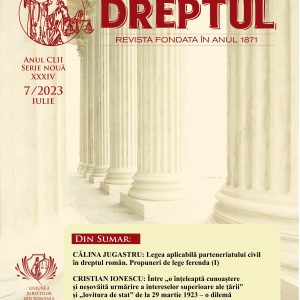
-
 Cum debitorul obligației de întreținere a executat în natură obligația, nu mai există temei pentru care el să fie ținut, ca pentru aceeași perioadă, să execute și prin plata sumei de bani stabilite prin hotărârea judecătorească, situație care se menține până când s-ar pune în executare hotărârea judecătorească prin care domiciliul minorei este stabilit la mamă, dată de când obligația ar deveni exigibilă. (Tribunalul Galați, Decizia civilă nr. 592 din 21 mai 2021, definitivă)
Cum debitorul obligației de întreținere a executat în natură obligația, nu mai există temei pentru care el să fie ținut, ca pentru aceeași perioadă, să execute și prin plata sumei de bani stabilite prin hotărârea judecătorească, situație care se menține până când s-ar pune în executare hotărârea judecătorească prin care domiciliul minorei este stabilit la mamă, dată de când obligația ar deveni exigibilă. (Tribunalul Galați, Decizia civilă nr. 592 din 21 mai 2021, definitivă) -
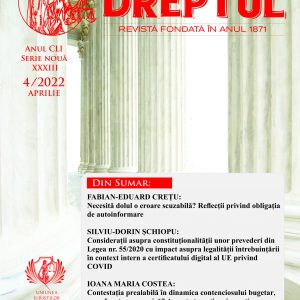 At the same time with the entry into force of the Law No 85/2014 on the procedures for preventing insolvency and for insolvency, it has been also regulated indirectly the refund of the judicial stamp duty to the plaintiff who invested a court of law with a litigation against the defendant-debtor against whom a final interlocutory judgment to open the insolvency procedure had not been pronounced until the moment of bringing the action by means of common law. This study analyses the differences of approach between the old insolvency law and the regulation in force since 2014, by pointing out how the legislator decided to solve the issue of lis pendens created by simultaneously analyzing the same application within two separate procedures: the general one, before the common law court, and the special one, before the syndic judge. The study also analyses the implications of good faith, respectively of the guilt of the plaintiff who makes use of this application, with discussions on the moment, the manner of requesting the refund of the stamp duty, respectively of the amount whose refund may be ordered.
At the same time with the entry into force of the Law No 85/2014 on the procedures for preventing insolvency and for insolvency, it has been also regulated indirectly the refund of the judicial stamp duty to the plaintiff who invested a court of law with a litigation against the defendant-debtor against whom a final interlocutory judgment to open the insolvency procedure had not been pronounced until the moment of bringing the action by means of common law. This study analyses the differences of approach between the old insolvency law and the regulation in force since 2014, by pointing out how the legislator decided to solve the issue of lis pendens created by simultaneously analyzing the same application within two separate procedures: the general one, before the common law court, and the special one, before the syndic judge. The study also analyses the implications of good faith, respectively of the guilt of the plaintiff who makes use of this application, with discussions on the moment, the manner of requesting the refund of the stamp duty, respectively of the amount whose refund may be ordered. -
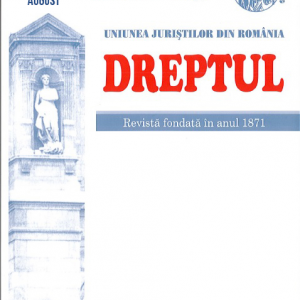 The author, after making a brief history on the taxation of the registration of motor vehicles in Romania, after our country joined the European Union (1 January 2007), expresses her opinion that even the last regulation in this matter (the Government Emergency Ordinance No 9/2013 on the environmental stamp for motor vehicles), being contrary to the provisions of Article 110 of the Treaty on the Functioning of the European Union, can not be legally applied in Romania, thus violating the principle of supremacy of the European law over the national law (in this case, the Romanian law).
The author, after making a brief history on the taxation of the registration of motor vehicles in Romania, after our country joined the European Union (1 January 2007), expresses her opinion that even the last regulation in this matter (the Government Emergency Ordinance No 9/2013 on the environmental stamp for motor vehicles), being contrary to the provisions of Article 110 of the Treaty on the Functioning of the European Union, can not be legally applied in Romania, thus violating the principle of supremacy of the European law over the national law (in this case, the Romanian law). -
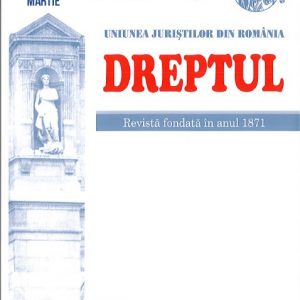 În acest număr al revistei publicăm două interesante studii semnate de eruditul dascăl de drept civil Dimitrie Alexandresco în publicația „Curierul judiciar” din 28 mai 1900 și, respectiv, de profesorul Vintilă Dongoroz, în aceeași revistă, nr. 11/1942. În primul articol, profesorul Dimitrie Alexandresco abordează o temă de drept internațional privat, și anume efectele gestiunii de afaceri în situația în care aceasta este încheiată pentru a-și produce efectele într-o altă țară decât cea de care aparțin părțile. Profesorul Alexandresco răspunde la întrebarea: „Care este legea după care se vor aprecia condițiile intrinseci de validitate și efectele acestui cvasi-contract?”. În al doilea articol, profesorul Vintilă Dongoroz prezintă o problemă de drept procesual penal referitoare la cererea de strămutare pentru legitimă suspiciune a unei cauze penale aflate în faza de cercetare la judecătorul de instrucție.
În acest număr al revistei publicăm două interesante studii semnate de eruditul dascăl de drept civil Dimitrie Alexandresco în publicația „Curierul judiciar” din 28 mai 1900 și, respectiv, de profesorul Vintilă Dongoroz, în aceeași revistă, nr. 11/1942. În primul articol, profesorul Dimitrie Alexandresco abordează o temă de drept internațional privat, și anume efectele gestiunii de afaceri în situația în care aceasta este încheiată pentru a-și produce efectele într-o altă țară decât cea de care aparțin părțile. Profesorul Alexandresco răspunde la întrebarea: „Care este legea după care se vor aprecia condițiile intrinseci de validitate și efectele acestui cvasi-contract?”. În al doilea articol, profesorul Vintilă Dongoroz prezintă o problemă de drept procesual penal referitoare la cererea de strămutare pentru legitimă suspiciune a unei cauze penale aflate în faza de cercetare la judecătorul de instrucție. -
 În acest număr al revistei publicăm două interesante studii semnate de eruditul dascăl de drept civil Dimitrie Alexandresco în publicația „Curierul judiciar” din 28 mai 1900 și, respectiv, de profesorul Vintilă Dongoroz, în aceeași revistă, nr. 11/1942. În primul articol, profesorul Dimitrie Alexandresco abordează o temă de drept internațional privat, și anume efectele gestiunii de afaceri în situația în care aceasta este încheiată pentru a-și produce efectele într-o altă țară decât cea de care aparțin părțile. Profesorul Alexandresco răspunde la întrebarea: „Care este legea după care se vor aprecia condițiile intrinseci de validitate și efectele acestui cvasi-contract?”. În al doilea articol, profesorul Vintilă Dongoroz prezintă o problemă de drept procesual penal referitoare la cererea de strămutare pentru legitimă suspiciune a unei cauze penale aflate în faza de cercetare la judecătorul de instrucție.
În acest număr al revistei publicăm două interesante studii semnate de eruditul dascăl de drept civil Dimitrie Alexandresco în publicația „Curierul judiciar” din 28 mai 1900 și, respectiv, de profesorul Vintilă Dongoroz, în aceeași revistă, nr. 11/1942. În primul articol, profesorul Dimitrie Alexandresco abordează o temă de drept internațional privat, și anume efectele gestiunii de afaceri în situația în care aceasta este încheiată pentru a-și produce efectele într-o altă țară decât cea de care aparțin părțile. Profesorul Alexandresco răspunde la întrebarea: „Care este legea după care se vor aprecia condițiile intrinseci de validitate și efectele acestui cvasi-contract?”. În al doilea articol, profesorul Vintilă Dongoroz prezintă o problemă de drept procesual penal referitoare la cererea de strămutare pentru legitimă suspiciune a unei cauze penale aflate în faza de cercetare la judecătorul de instrucție. -

